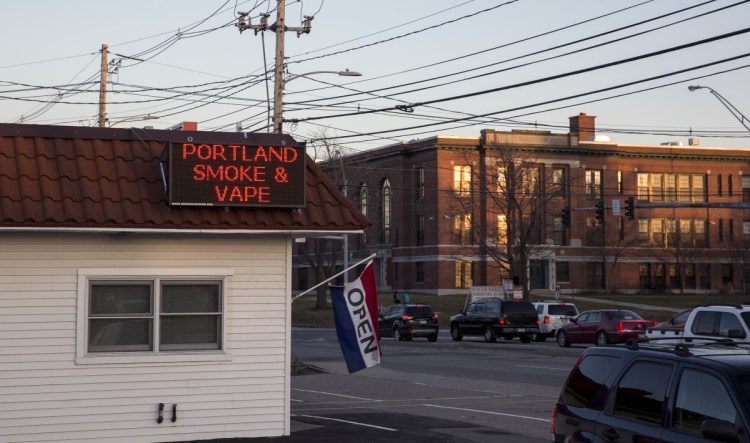SOUTH PORTLAND — The City Council is on track to approve the first ban in Maine on the sale of flavored tobacco liquids used in electronic cigarettes, prompted by the recent opening of a vape shop across the street from Mahoney Middle School.
City officials had been discussing a possible zoning change that would prohibit similar shops from opening within 1,000 feet of schools and other locations frequented by children.
The council gave the nod to the flavored tobacco ban Tuesday, after recognizing that a zoning change would have little effect on the Portland Smoke & Vape shop that opened in October at 585 Broadway.
Superintendent Ken Kunin said the flavored tobacco ban “would send a powerful message” about a growing issue in Maine schools, where vaping has become the largest and most time-consuming disciplinary problem, according to the Maine Principals’ Association.
Councilor Deqa Dhalac, a social worker, said the youth vaping problem is pervasive, rooted in students’ desire to “look cool” and often goes unchecked in schools, noting that she’s heard stories about students charging e-cigarettes plugged into their school-provided laptops while in the classroom.
“We are trying to protect children,” Dhalac said. “I see this as a public health issue.”
South Portland’s attention to the vaping issue comes as Democratic Gov. Janet Mills last month announced that she included $10 million from the state’s tobacco settlement fund in her two-year budget proposal to bolster smoking prevention and education for youths, including vaping.
At the same time, legislators are considering a bill, L.D. 152, that would ban e-cigarettes on school grounds. The bill would simply update existing state law to include products that didn’t even exist when Maine banned smoking on school grounds in 2015.
NICOTINE DEPENDENCY
Use of e-cigarettes among Maine high school students has skyrocketed, from 1.5 percent of all students in 2011 to 20.8 percent in 2018, setting students up for a life of nicotine dependency, said Hillary Schneider, the state government relations director for the American Cancer Society and Cancer Action Network.
Last year, Maine became the fifth state to ban the sale of tobacco, including vaping products, to anyone under age 21, in line with the state’s drinking age. The new smoking age excluded people who were at least 18 before the law went into effect July 1.
At the federal level, the U.S. Food and Drug Administration last year imposed sharp sales restrictions on flavored electronic smoking devices, which vaporize liquid tobacco and other substances.
The stated goal of South Portland’s flavored tobacco ban would be to help residents avoid “a potential lifetime of nicotine addiction and the associated health risks. Flavors in tobacco products increase the appeal of those tobacco products to youth (under age 18) and promote youth initiation to the use of tobacco products. Flavors in tobacco products are also attractive to established tobacco product users.”
The council’s conversation about the proposed ordinance focused on candy- and fruit-flavored tobacco liquids thought to be especially enticing to children. However, the ban also would apply to cigars, chewing tobacco and other real tobacco products with similar flavors. The ban would exclude cigarettes and other tobacco products flavored with menthol, mint and wintergreen.
FLAVORED TOBACCO BAN
Councilors raised several concerns about the proposed ban that will be addressed at a second workshop on March 26, including a desire by a few members to ban e-cigarette sales entirely. Additional e-cigarette restrictions, including a 1,000-foot zoning buffer near schools, could be brought up in the future.
Sally Daggett, the city’s attorney, noted that while similar bans on flavored tobacco liquids in Chicago, New York City and Providence, Rhode Island, have withstood court challenges, she knew of no municipality or state that had banned e-cigarettes altogether.
City Manager Scott Morelli said more than 30 tobacco retailers in South Portland will be notified 30 days before the council holds a first reading and public hearing on the flavored tobacco ban.
If the ban is approved, it would go into effect on Sept. 1 and be enforced by police and other city officials. Violators would be fined $500 for a first offense and $1,000 for subsequent offenses.
People who spoke against the ban consisted of several business owners, including Portland Smoke & Vape owner Anthony Scott, who urged city officials to reach out for additional information about vaping.
Rose West, owner of Broadway Variety, said she was surprised and confused by the ordinance proposal and warned that teenagers would purchase flavored tobacco liquids elsewhere.
“This is not a new issue. It’s just a different issue,” West told the council. “We have a pretty good track record of not selling alcohol or tobacco to underage children. Should we also ban bubble gum-flavored alcohol, cotton candy, Swedish fish, because they’re attractive?”
Several supporters of the ban praised councilors for taking a stand against the vape shop and urged them to go further without regard for the impact on businesses.
“I hope you guys continue to show courage,” said John Wallace of Scammon Street. “They opened a vape shop across from a middle school. That was a terrible idea and (they should) pay the price.”
Send questions/comments to the editors.



Comments are no longer available on this story